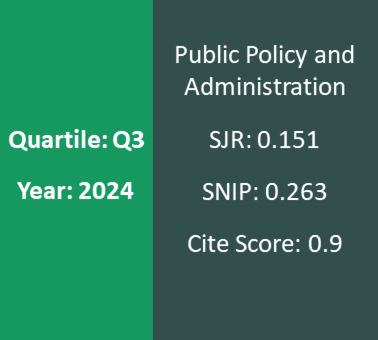The Uses of Artificial Intelligence in the Public Sector: Challenges and Prospects
DOI:
https://doi.org/10.5755/j01.ppaa.24.3.39489Keywords:
Artificial Intelligence, public sector, welfare state, technologies, applicability, governanceAbstract
This article examines the integration of artificial intelligence (AI) in the public sector, highlighting its transformative potential and associated challenges. AI has the capacity to revolutionize public administration by enhancing service delivery, decision-making, and operational efficiency through advanced data analysis, predictive analytics, and automation. Despite these opportunities, the adoption of AI in government faces significant obstacles, including technical limitations, ethical concerns, legal constraints, and organizational resistance. Key issues such as data privacy, system security, algorithmic bias, and accountability for AI-driven decisions are explored. This study employs a theoretical framework based on literature analysis, document review, and value interpretation. The article also discusses the varying levels of AI deployment, from simple automation to fully autonomous systems, and the strategic approaches needed for successful implementation. The research objectives are to identify the principal challenges and opportunities associated with AI integration in public administration and to answer key questions regarding effective governance, ethical management, and policy formulation. The study also aims to contribute to both academic discourse and policy practice by proposing actionable recommendations for optimizing AI deployment in the public sector. It emphasizes the need for robust governance frameworks, ethical guidelines, and international cooperation to ensure AI technologies enhance public value while preserving trust and democratic principles. The findings underscore the importance of a balanced approach to AI integration, promoting innovation while safeguarding societal interests.
References
“AI Act | Shaping Europe’s Digital Future.” 2024. September 25, 2024. https://digital-strategy.ec.europa.eu/en/policies/regulatory-framework-ai.
Alhosani, Khalifa, and Saadat M. Alhashmi. 2024. “Opportunities, Challenges, and Benefits of AI Innovation in Government Services: A Review.” Discover Artificial Intelligence 4 (1): 18. https://doi.org/10.1007/s44163-024-00111-w.
Berryhill, J., K. K. Heang, R. Clogher, and K. McBride. 2019. “Hello, World: Artificial Intelligence and Its Use in the Public Sector.” OECD Working Papers on Public Governance No. 36. https://doi.org/10.1787/726fd39d-en.
Bianchini, Devis, Carlo Bono, Alessandro Campi, Cinzia Cappiello, Stefano Ceri, Francesca De Luzi, Massimo Mecella, Barbara Pernici, and Pierluigi Plebani. 2024. “Challenges in AI-Supported Process Analysis in the Italian Judicial System: What After Digitalization?” Digit. Gov.: Res. Pract. 5 (1): 10:1-10:10. https://doi.org/10.1145/3630025.
Brandão, Michele A., Arthur P. G. Reis, Bárbara M. A. Mendes, Clara A. Bacha De Almeida, Gabriel P. Oliveira, Henrique Hott, Larissa D. Gomide, et al. 2024. “PLUS: A Semi-Automated Pipeline for Fraud Detection in Public Bids.” Digit. Gov.: Res. Pract. 5 (1): 5:1-5:16. https://doi.org/10.1145/3616396.
Carney, Terry. 2020. “Artificial Intelligence in Welfare: Striking the Vulnerability Balance?” Monash University Law Review 46 (2): 23–51. https://doi.org/10.3316/informit.20220124060852.
Chen, Yu-Che, Michael J. Ahn, and Yi-Fan Wang. 2023. “Artificial Intelligence and Public Values: Value Impacts and Governance in the Public Sector.” Sustainability 15 (6): 4796. https://doi.org/10.3390/su15064796.
Chhatre, Rohan. 2024. “Policy and Regulatory Frameworks for Artificial Intelligence.” Harbin Gongcheng Daxue Xuebao/Journal of Harbin Engineering University 45 (05): 443–48.
Dencik, Lina, and Anne Kaun. 2020. “Datafication and the Welfare State.” Global Perspectives 1 (1). https://doi.org/10.1525/gp.2020.12912.
Entsminger, Josh. 2022. “PUBLIC SECTOR ARTIFICIAL INTELLIGENCE STRATEGIES: CONSIDERATIONS FOR A PUBLIC VALUE APPROACH,” July.
Henman, Paul. 2020. “Improving Public Services Using Artificial Intelligence: Possibilities, Pitfalls, Governance.” Asia Pacific Journal of Public Administration 42 (4): 209–21. https://doi.org/10.1080/23276665.2020.1816188.
Hjaltalin, Illugi Torfason, and Hallur Thor Sigurdarson. 2024. “The Strategic Use of AI in the Public Sector: A Public Values Analysis of National AI Strategies.” Government Information Quarterly 41 (1): 101914. https://doi.org/10.1016/j.giq.2024.101914.
Jakub, Farooq, Khuram,Solowiej,Bartosz. n.d. “Artificial Intelligence in the Public Sector : Maximizing Opportunities, Managing Risks.” Text/HTML. World Bank. Accessed October 12, 2024. https://documents.worldbank.org/en/publication/documents-reports/documentdetail/809611616042736565/Artificial-Intelligence-in-the-Public-Sector-Maximizing-Opportunities-Managing-Risks.
James, Alexandra, and Andrew Whelan. 2022. “‘Ethical’ Artificial Intelligence in the Welfare State: Discourse and Discrepancy in Australian Social Services.” Critical Social Policy 42 (1): 22–42. https://doi.org/10.1177/0261018320985463.
Maalla, Hala. 2021. “Artificial Intelligence in Public Sector: A Review for Government Leaders about AI Integration into Government Administrations.” International Journal of Academic Research in Economics and Management Sciences 10 (December). https://doi.org/10.6007/IJAREMS/v10-i4/11911.
Mergel, Ines, Helen Dickinson, Jari Stenvall, and Mila Gasco. n.d. “Implementing AI in the Public Sector.” Public Management Review 0 (0): 1–14. https://doi.org/10.1080/14719037.2023.2231950.
Mikhaylov, Slava Jankin, Marc Esteve, and Averill Campion. 2018. “Artificial Intelligence for the Public Sector: Opportunities and Challenges of Cross-Sector Collaboration.” Philosophical Transactions of the Royal Society A: Mathematical, Physical and Engineering Sciences 376 (2128): 20170357. https://doi.org/10.1098/rsta.2017.0357.
Neumann, Oliver, Katharina Guirguis, and Reto Steiner. 2024. “Exploring Artificial Intelligence Adoption in Public Organizations: A Comparative Case Study.” Public Management Review 26 (1): 114–41. https://doi.org/10.1080/14719037.2022.2048685.
Norkus, Zenonas. 2008. “Kokia demokratija, koks kapitalizmas? : pokomunistinė transformacija Lietuvoje lyginamosios istorinės sociologijos požiūriu.” Book. Lituanistika. Vilniaus universiteto leidykla. 2008. https://www.lituanistika.lt/content/14981.
Sun, Tara Qian, and Rony Medaglia. 2019. “Mapping the Challenges of Artificial Intelligence in the Public Sector: Evidence from Public Healthcare.” Government Information Quarterly 36 (2): 368–83. https://doi.org/10.1016/j.giq.2018.09.008.
Surya, Lakshmisri. 2019. “Artificial Intelligence in Public Sector.” SSRN Scholarly Paper. Rochester, NY. https://papers.ssrn.com/abstract=3785663.
Uzun Ozsahin, Dilber, Declan Ikechukwu Emegano, Berna Uzun, and Ilker Ozsahin. 2023. “The Systematic Review of Artificial Intelligence Applications in Breast Cancer Diagnosis.” Diagnostics 13 (1): 45. https://doi.org/10.3390/diagnostics13010045.
Vida Fernandez, Jose. 2023. “Artificial Intelligence in Government: Risks and Challenges of Algorithmic Governance in the Administrative State.” 30 Indiana J. Global Legal Studies 65 30 (1). https://www.repository.law.indiana.edu/ijgls/vol30/iss1/5.
Wirtz, Bernd W., Jan C. Weyerer, and Carolin Geyer. 2019. “Artificial Intelligence and the Public Sector—Applications and Challenges.” International Journal of Public Administration 42 (7): 596–615. https://doi.org/10.1080/01900692.2018.1498103.





